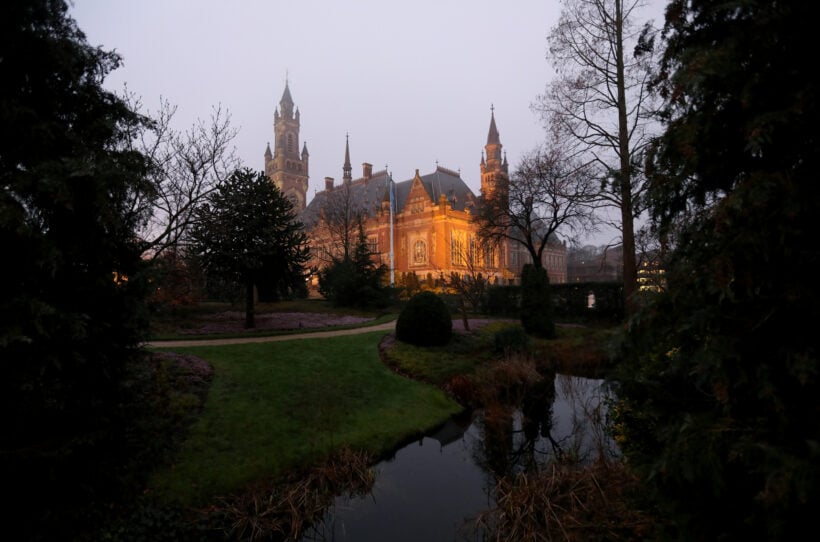
THE HAGUE/GAZA, Jan 26 (Reuters) – U.N. judges in The Hague will rule on Friday whether to order Israel to suspend its military campaign in Gaza as Israeli forces continued to pound the main southern city of Khan Younis, from where thousands of Gazans were fleeing to the south.
The Israeli military said on Friday it was engaged in “intensive battles in the heart of Khan Younis”, with forces striking dozens of Hamas fighters and infrastructure from the air and ground. It said forces also fired at Hamas targets in northern Gaza and along the Gaza coastline.
Residents said gun battles continued overnight, with Israeli forces blowing up buildings and houses in the western part of the city.
Gaza officials said the death toll from the campaign, now in its fourth month, has risen to 26,083, with 183 killed in the past 24 hours and many more feared trapped under flattened buildings.
The war, launched after Hamas fighters killed 1,200 people and captured more than 240 hostages on Oct 7, has displaced most of the enclave’s 2.3 million people, some multiple times.
The judges of the International Court of Justice (ICJ), also called the World Court, are due to rule on Friday on South Africa’s request for emergency measures against Israel in a case accusing it of state-led genocide in the Gaza Strip.
“South Africa is hopeful, we have always approached this case in a positive spirit,” Foreign Minister Naledi Pandor said.
“But our core purpose is really that it is vital to highlight the plight of the innocent in Palestine and to also alert the international community to the great harm that is being done to the people of Palestine.”
The court will issue its ruling at 1 p.m. (1200 GMT) in a hearing expected to last about an hour. While the judges will not rule on the merits of the genocide allegations, which may take years to decide, South Africa asked the court to issue an interim order compelling Israel to suspend military operations.
Israel has called South Africa’s allegations false and “grossly distorted”, and said it makes the utmost efforts to avoid civilian casualties in Gaza.
The ICJ’s rulings are final and without appeal, but it has no way of enforcing them. Israel on Thursday expressed confidence that the court would “throw out these spurious and specious charges.” Hamas said it would abide by an ICJ ceasefire order if Israel reciprocates.
HUGE ASSAULT
The huge assault this week on the city of Khan Younis is one of the biggest yet, now hitting territory housing hundreds of thousands of thousands of displaced civilians. Palestinians say Israel has blockaded hospitals making it impossible for rescuers to reach the dead and wounded.
“We believe many victims are still under the rubble and on the roads, the occupation prevents ambulance and civil emergency teams from reaching them,” Gaza health ministry spokesman Ashraf Al-Qidra said.
Israel denies it has blockaded hospitals in the battle zone but says military action near them is necessary because Hamas fighters operate there, which the militants and medical workers deny.
The military said it was coordinating with hospital staff to ensure they remain “operational and accessible”.
“The facts on the ground disprove the blatant misinformation that has been disseminated over the last 72 hours falsely claiming that the hospitals are under siege or attack,” it said in a statement.
GENOCIDE CONVENTION
The 1948 Genocide Convention, enacted in the wake of the mass murder of Jews in the Nazi Holocaust, defines genocide as “acts committed with intent to destroy, in whole or in part, a national, ethnical, racial or religious group”.
Palestinians said they hoped world powers had the courage to compel Israel to stop the bombing if the ICJ orders a ceasefire.
“What happens if after the court Israel continued its massacres? The world will appear like a joke,” said Tamer, 55, a businessman and father of four now displaced in Rafah, the small city at Gaza’s southern edge where more than half the enclave’s population is now huddled, most in makeshift tents or public buildings.
“We are tired, our children are exhausted, they are deprived of sleep and food,” he said. “We are being starved and everyone awaits his turn to die by Israeli bombs if this doesn’t end.”
Thousands more had arrived in Rafah the past few days, worsening the desperate hunt for food and a place to camp in the rainy winter cold.
The Israeli military repeated orders on Friday for civilians to evacuate swathes of southern and western Khan Younis and head to Al-Mawasi further west. Residents say that has been impossible because roads were blocked and under Israeli fire.
Food is scarce in the south, and the situation is even worse in the north and centre of Gaza, where aid agencies say thousands of people face starvation, especially small children who are most vulnerable to malnutrition.
“Everybody we talk to begs for food,” said World Health Organisation’s Gaza representative Sean Casey.
The adults could handle the hunger, “but our children can’t,” said Abu Abdallah Humeid, a resident of Jabalia in the north of Gaza. With no more flour left, people there have been grinding corn and barley to make dry bread.
(Reporting by Nidal al-Mughrabi in Doha and Fadi Shana and Bassam Masoud in Gaza, Stephanie van den Berg in The Hague; Additional reporting by Henriette Chacar and Steven Scheer in Jerusalem, Anthony Deutsch in The Hague, Nellie Peytyon in Johannesburg; Writing by Sharon SingletonEditing by Peter Graff)

